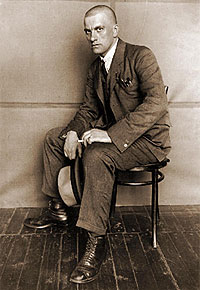 More commonly known as Vladimir Vladimirovich Mayakovsky, Vladimir Vladimirovich was one of the foremost poets of the Russian revolution. Born in 1893 in Bagdadi, Georgia, he was of Russian, Cossack and Ukrainian descent. His childhood was marred by the death of his father in 1906, when the boy was thirteen years old. Vladimirovich attended the gymnasium at Kutai, and later a school in Moscow. In 1908, at the age of 15, he joined the Moscow committee of the Russian Socialist Democratic Party. His activity with the Party led to his arrest for subversive activity in 1909, and he was imprisoned for six months. It was during his imprisonment that Vladimirovich began to write poetry. After his release, he joined the Russian Futurist group, a group of artists and intellectuals who sought to free the arts from academic traditions.
More commonly known as Vladimir Vladimirovich Mayakovsky, Vladimir Vladimirovich was one of the foremost poets of the Russian revolution. Born in 1893 in Bagdadi, Georgia, he was of Russian, Cossack and Ukrainian descent. His childhood was marred by the death of his father in 1906, when the boy was thirteen years old. Vladimirovich attended the gymnasium at Kutai, and later a school in Moscow. In 1908, at the age of 15, he joined the Moscow committee of the Russian Socialist Democratic Party. His activity with the Party led to his arrest for subversive activity in 1909, and he was imprisoned for six months. It was during his imprisonment that Vladimirovich began to write poetry. After his release, he joined the Russian Futurist group, a group of artists and intellectuals who sought to free the arts from academic traditions.
During those years, Vladimir attended the Moscow Institute of Painting, Sculpture and Architecture. Although the lectures bored him, Vladimirovich continued to write poetry. There he also met his first patron, a man who would be a lifelong friend, David Burliuk. According to the stories, Burliuk heard Vladimirovich’s poetry, and promptly offered to pay him 50 kopeks a day so that he could continue to write without starving. By 1912, Vladimirovich was appearing regularly with the group of poets that included Burliuk. The poets read on street corners in “outlandish garb”, deliberately making their performances a nuisance to the established academia. By 1914, his first play was published and performed, and his activities led to his expulsion from the Moscow Institute.
In 1915, Vladimir published his first long poem, Cloud in the Trousers. It was also that year that he met Lili Birk, wife of Osip Birk, and the woman who would be the love of his life. His relationship with her was to last until 1928 and to greatly influence both his poetry and his life. Lilya’s husband, Osip, was to become Vladimirovich’s publisher and collaborator, apparently having no objection to the affair between his wife and the poet.
Vladimirovich’s popularity waxed with the Bolshevik Revolution. His slogans and posters fueled the revolutionaries and celebrated their victories. In the years following the revolution, the poet was one of the few who was freely allowed to travel in and out of the country. In 1922, he traveled to Latvia, Berlin and Paris, and met with Cocteau, Picasso, Braque and Lecter. His reputation as a poet and playwright continued to grow, and in 1923, began publishing Lef, a leftist literary journal. It featured the works of writers like Pasternak, Kamensky, Eisenstein and Brik.
In 1925, Vladimirov visited the United States, stopping first in Cuba and in Mexico. He spent several months touring the U.S. and giving lectures, readings and offering support to the struggle of the workers to unionize. His experiences in the U.S. were the basis for his book Stikki of Ameriki, or Poems of America. His poetry was increasingly propagandized, created for a mass audience. For years, he remained a darling of the Soviet Union, but his criticism of poets and writers outside the Revolution earned him criticism as a literary hack and talentless writer.
Toward the end of the decade, Vladimir began to find himself alienated from the Party line. His poetry and productions became critical of the New Order, and at least one debuted to critical and popular failure. At about the same time, he had become estranged from his precious Lili, and fallen in love with a Russian refugee, Tatiana Yakovleva. She refused his proposal, plunging him into a depression. The combination of his multiple estrangements – from writing, from the government, from love – proved too much, and in late April of 1930, Vladimir Vladimirovich Mayakovsky took his own life.


You must register to comment. Log in or Register.